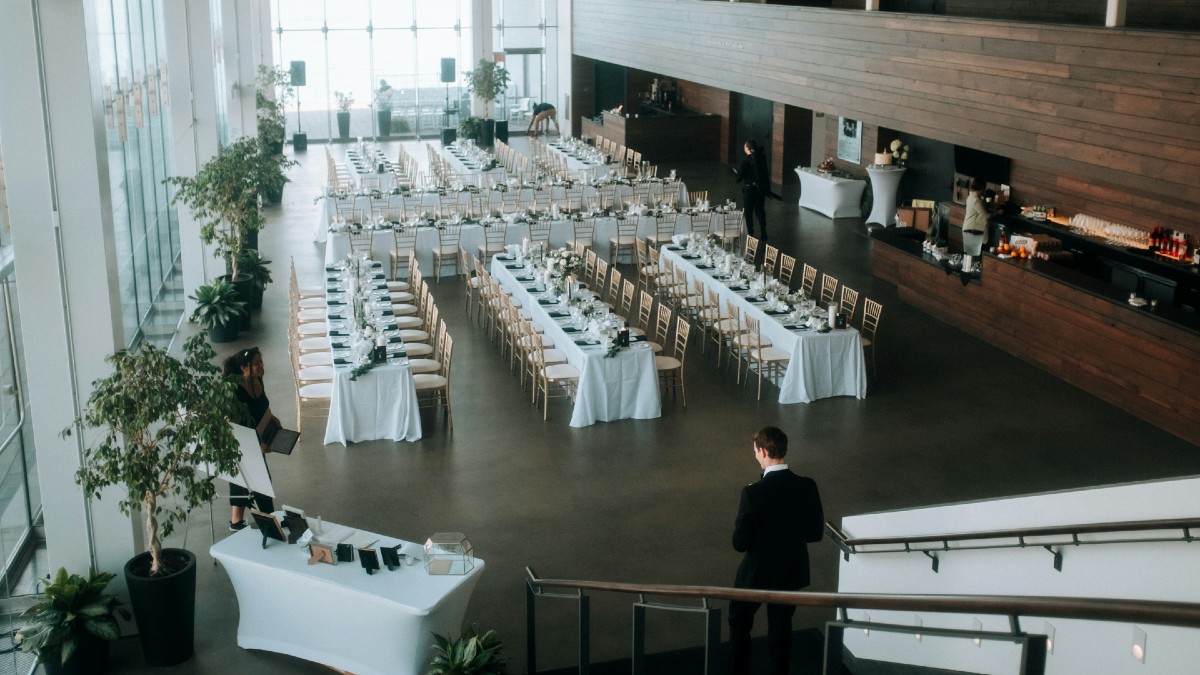The first step in the corporate event planning process is writing an event brief. Why Write an Event Brief? Event briefs are excellent planning tools that serve as a comprehensive, centralized overview of your event, detailing the critical elements involved, event description, target audience, statuses, and timelines, as well as every internal and external element needed to successfully execute your event. It's the best way to keep your entire planning team on the same page with a clear vision of what needs to be done and by who. It doesn’t matter if your event is for 50 people or 500; writing an event brief will show your team, PCO or venue booking agent like VenueNow what you need, want and can afford. Writing a great event brief will save you time and a lot of stress.
Here's how to write a professional event brief in four steps.
Step 1: Who are you and what kind of event are you planning?
Writing an event brief that’s clear, concise, and full of useful information will save you so much back-and-forth emailing, phone calls and time. The most important information must go at the top. This signals to the booking agent what your priorities are. In addition to your brief or overview, having an event plan and checklist can help you put together a successful event. But, note that your event brief format may vary depending on the type of event.
Start with your company name, the event type, and the event name.
The event name and type can serve to immediately eliminate certain venue types. For example, if you’re planning Company X Christmas Party, the booking agent isn’t going to suggest an auditorium for your event.
Step 2: How many guests are coming and what’s your budget?
Add in your budget and guest count.
Next, what’s your budget? Is it flexible? Strict budgets that must be adhered to will generate a set sample of venues. Flexible budgets that have more wiggle room will mean an extended shortlist. The budget also affects the additions and amenities you'll be able to afford for the event. More room means a more tailored event experience.
Your event budget goes hand in hand with your capacity. How many people will be attending this event? When writing an event brief, put the number of guests right at the top. Spaces that are too small won’t comfortably accommodate everyone, while spaces that are too big will look sparse and a bit sad.
Include in the event brief whether your guests will be standing or sitting. Each style of event set-up has a unique capacity. For example, a cocktail event can easily handle a larger guest list than a banquet dinner.
How much will your event cost?
Calculate your event cost in under 5 minutes
Step 3: Set your date and time
Availability is one of the first hurdles any event planner will come across.
If the date of your event is fixed, make a note of that. And if it’s flexible, suggest a couple of different dates in order of preference. Key dates (like Friday nights or seasonal events in Nov-Dec) fill fast. So, it’s important to work out your dates early and if possible; have more than one option.
Your event brief should also include the proposed start time and, if required, a realistic timeframe for a bump in and out. The more set-up that’s required, the more time you’re going to need. Some venues have very strict limitations on how early the client/suppliers can have access to the venue. Relatively small social events will not need a lot of time to set up. Large-scale events with external AV equipment, decorations and activations take longer to set up and pack down.
Step 4: How should your event look?
Write down any and all ideas you have for the look and feel of the event.
Maybe natural light is a priority. Or a venue with a warehouse layout and industrial vibe. Whatever your vision, be sure to include it when writing the event brief. Otherwise, your venue booking agent or PCO might present you with a list of options that don't meet the picture you had in your head.
The decorations, layout and ambience all stem from what style of venue you want. By including all these handy details when writing an event brief, you can kick your event off the right way, eliminating the need for endless back and forth.
Summary on how to write the perfect event brief
To make your event planning easier, your Event Brief Template should have the following details:
-Event Title
-Event Format (in-person, virtual, or hybrid)
-Event Date
-Event Time
-Event Agenda
-Location, venue, or site preferences
-Budget
-Expected number of attendees
-Event Website Description and other key elements
Write your own event brief today!
Looking for a venue for your next event?
VenueNow has the perfect solution for you. We’ve got a wide range of venues to fit any budget, type, and size of event. Our experienced team will help you find the best place for your dream event. Get started now by creating an Event Brief with VenueNow!
Submit a brief and find your ideal venue
Save time, effort and money organising your next event. Submit your event brief below & we'll match you with a dedicated Venue Consultant to help you find, compare and book your perfect venue.
Follow us on social media to stay up to date with the latest news
Customers
Want to get in contact?
Call our support team on 1300 647 488 during business hours AEST.
Follow Us
© Copyright VenueNow 2026 | SPARE GROUP PTY LTD | ABN 22 607 830 302







